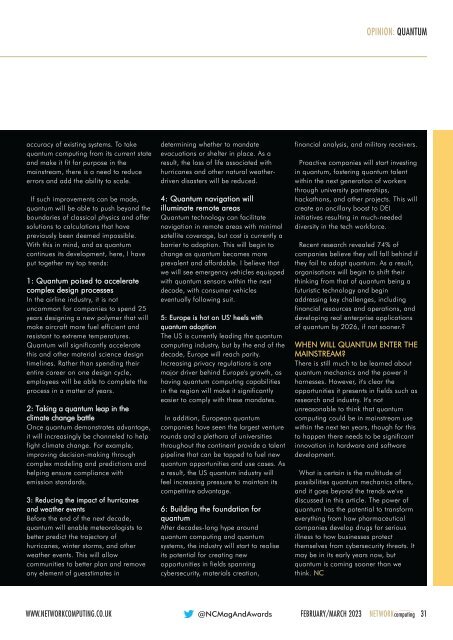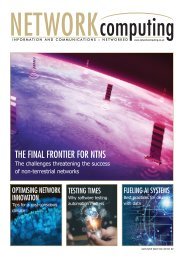NC Feb-Mar 2023
You also want an ePaper? Increase the reach of your titles
YUMPU automatically turns print PDFs into web optimized ePapers that Google loves.
OPINION: QUANTUM<br />
accuracy of existing systems. To take<br />
quantum computing from its current state<br />
and make it fit for purpose in the<br />
mainstream, there is a need to reduce<br />
errors and add the ability to scale.<br />
If such improvements can be made,<br />
quantum will be able to push beyond the<br />
boundaries of classical physics and offer<br />
solutions to calculations that have<br />
previously been deemed impossible.<br />
With this in mind, and as quantum<br />
continues its development, here, I have<br />
put together my top trends:<br />
1: Quantum poised to accelerate<br />
complex design processes<br />
In the airline industry, it is not<br />
uncommon for companies to spend 25<br />
years designing a new polymer that will<br />
make aircraft more fuel efficient and<br />
resistant to extreme temperatures.<br />
Quantum will significantly accelerate<br />
this and other material science design<br />
timelines. Rather than spending their<br />
entire career on one design cycle,<br />
employees will be able to complete the<br />
process in a matter of years.<br />
2: Taking a quantum leap in the<br />
climate change battle<br />
Once quantum demonstrates advantage,<br />
it will increasingly be channeled to help<br />
fight climate change. For example,<br />
improving decision-making through<br />
complex modeling and predictions and<br />
helping ensure compliance with<br />
emission standards.<br />
3: Reducing the impact of hurricanes<br />
and weather events<br />
Before the end of the next decade,<br />
quantum will enable meteorologists to<br />
better predict the trajectory of<br />
hurricanes, winter storms, and other<br />
weather events. This will allow<br />
communities to better plan and remove<br />
any element of guesstimates in<br />
determining whether to mandate<br />
evacuations or shelter in place. As a<br />
result, the loss of life associated with<br />
hurricanes and other natural weatherdriven<br />
disasters will be reduced.<br />
4: Quantum navigation will<br />
illuminate remote areas<br />
Quantum technology can facilitate<br />
navigation in remote areas with minimal<br />
satellite coverage, but cost is currently a<br />
barrier to adoption. This will begin to<br />
change as quantum becomes more<br />
prevalent and affordable. I believe that<br />
we will see emergency vehicles equipped<br />
with quantum sensors within the next<br />
decade, with consumer vehicles<br />
eventually following suit.<br />
5: Europe is hot on US' heels with<br />
quantum adoption<br />
The US is currently leading the quantum<br />
computing industry, but by the end of the<br />
decade, Europe will reach parity.<br />
Increasing privacy regulations is one<br />
major driver behind Europe's growth, as<br />
having quantum computing capabilities<br />
in the region will make it significantly<br />
easier to comply with these mandates.<br />
In addition, European quantum<br />
companies have seen the largest venture<br />
rounds and a plethora of universities<br />
throughout the continent provide a talent<br />
pipeline that can be tapped to fuel new<br />
quantum opportunities and use cases. As<br />
a result, the US quantum industry will<br />
feel increasing pressure to maintain its<br />
competitive advantage.<br />
6: Building the foundation for<br />
quantum<br />
After decades-long hype around<br />
quantum computing and quantum<br />
systems, the industry will start to realise<br />
its potential for creating new<br />
opportunities in fields spanning<br />
cybersecurity, materials creation,<br />
financial analysis, and military receivers.<br />
Proactive companies will start investing<br />
in quantum, fostering quantum talent<br />
within the next generation of workers<br />
through university partnerships,<br />
hackathons, and other projects. This will<br />
create an ancillary boost to DEI<br />
initiatives resulting in much-needed<br />
diversity in the tech workforce.<br />
Recent research revealed 74% of<br />
companies believe they will fall behind if<br />
they fail to adopt quantum. As a result,<br />
organisations will begin to shift their<br />
thinking from that of quantum being a<br />
futuristic technology and begin<br />
addressing key challenges, including<br />
financial resources and operations, and<br />
developing real enterprise applications<br />
of quantum by 2026, if not sooner.?<br />
WHEN WILL QUANTUM ENTER THE<br />
MAINSTREAM?<br />
There is still much to be learned about<br />
quantum mechanics and the power it<br />
harnesses. However, it's clear the<br />
opportunities it presents in fields such as<br />
research and industry. It's not<br />
unreasonable to think that quantum<br />
computing could be in mainstream use<br />
within the next ten years, though for this<br />
to happen there needs to be significant<br />
innovation in hardware and software<br />
development.<br />
What is certain is the multitude of<br />
possibilities quantum mechanics offers,<br />
and it goes beyond the trends we've<br />
discussed in this article. The power of<br />
quantum has the potential to transform<br />
everything from how pharmaceutical<br />
companies develop drugs for serious<br />
illness to how businesses protect<br />
themselves from cybersecurity threats. It<br />
may be in its early years now, but<br />
quantum is coming sooner than we<br />
think. <strong>NC</strong><br />
WWW.NETWORKCOMPUTING.CO.UK @<strong>NC</strong>MagAndAwards FEBRUARY/MARCH <strong>2023</strong> NETWORKcomputing 31

















